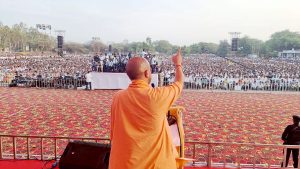Instances of hate speech in India saw a sharp increase in 2024. Yet, neither the government nor the public is alarmed or even concerned.
According to “Report 24: Hate Speech Events in India,” released by the Washington-based research group India Hate Lab on February 10, there was a 74 percent rise in anti-minority hate speech last year, especially during the months of the general elections between March and June 2024. The report documented 1,165 incidents of hate speech events at rallies, processions, and cultural gatherings attended by thousands of people. A previous India Hate Lab report recorded 668 hate speech events in 2023.
A whopping 98 percent of these hate speeches were targeted at Muslims, India’s largest religious minority, and the rest at Christians and other groups. Significantly, 80 percent of these hate events took place in states ruled by the Hindu supremacist Bharatiya Janata Party (BJP). The escalation in hate speech, the report said, was “deeply intertwined with the ideological ambitions of the ruling BJP and the broader Hindu nationalist movement.”
The spike in hate speech during the election season in 2024 was aimed at religious polarization to consolidate the Hindu majority vote bank. The three states that recorded the highest number of such hate speech events were Uttar Pradesh, Madhya Pradesh, and Maharashtra — states where the BJP is not only strongly entrenched but also working hard to ensure that it stays that way.
The report drew attention to the dangerous nature of the hate speech — 22 percent were direct calls for violence, for ethnic cleansing of minority Muslims and Christians. An equal proportion called for the demolition of Muslim and Christian places of worship. Some exhorted Hindus to carry arms to protect themselves from minorities. Rhetoric relating to Hindutva conspiracy theories like “love jihad,” “vote jihad,” and “population jihad” was also articulated.
The majority of these hate speech events were organized by the BJP and Hindutva groups that are allied with its ideological mentor, the Rashtriya Swayamsewak Sangh.
Of grave concern is the fact that those who demonize Muslims are no longer fringe elements but mainstream political leaders and Hindutva-espousing “godmen.” Figuring prominently in the list of politicians delivering hate speeches are Uttar Pradesh Chief Minister Yogi Adityanath, Prime Minister Narendra Modi, and Home Minister Amit Shah.
As usual, BJP governments at the center and states have not responded to the report’s findings. The BJP has rejected charges of inciting Islamophobia. Reacting to the report, party spokesperson Jaiveer Shergill told the BBC, “Today’s India does not need any certification from any ‘anti-India reports industry’ which is run by vested interests to prejudice and dent India’s image.”
As disturbing as the inaction of the authorities to hate speech is the lack of any public outrage over such speech. Scant reportage of hate speech, especially when delivered by members of the ruling party, is partly responsible for the public silence.
This is in sharp contrast to the national outrage this week in response to a crass comment by Indian Youtuber Ranveer Allahbadia aka “BeerBiceps” on the online reality show “India’s Got Latent.” Allahbadia, a popular YouTuber with a massive following, had asked a tasteless question pertaining to incest, and panelists joined in with equally offensive remarks. Allahbadia was slammed by the government, politicians, and netizens.
So severe was the backlash that governments of some BJP-ruled states swung into action. Police in Assam and Maharashtra lodged cases against Allahbadia and four other panelists on the show. The Maharashtra Cyber Police has charged them under the criminal law code for outraging the modesty of a woman, speech that incites hatred among groups, attempting to insult religious beliefs of any section, and obscenity.
So huge was the uproar sparked off by the incident that Maharashtra Chief Minister Devendra Fadnavis warned of stern action and spoke of “limitations of free speech.”
Incidentally, Modi feted Allahbadia last year for being the “Disruptor of the Year” at the first National Creators Award event.
Compare the tidal wave of outrage evoked by Allahbadia’s remark with the complete indifference of Indians to the Indian Hate Lab report. The swiftness with which BJP governments acted to crack down on Allahbadia and his colleagues earlier this week has been wholly missing from their response to perpetrators of hate speeches in their states, thereby underscoring the tacit support and patronage that divisive communal rhetoric enjoys.
Opposition parties have also repeatedly pointed out that the Election Commission of India is a silent spectator to BJP hate speech, despite it being a clear violation of the Model Code of Conduct that comes into effect during elections.
The other crucial issue flagged by the India Hate Lab report is the role of big social media platforms that play a pivotal role in amplifying hate speech in 2024. Be it Meta’s Facebook livestreaming hate speech or YouTube videos, the report pointed out that big tech companies are reluctant to remove this dangerous content — even though online hate speech has incited offline violence, as in the northeast Delhi riots in 2020.
Interestingly, while the India Hate Lab report found mention in a section of the print media, it has largely been ignored by the much more popular television news networks, which chose to focus their outrage on the “BeerBiceps” controversy.
Indian public sensibilities are more offended by obscene jokes by stand-up comics and YouTubers, resulting in police slapping criminal charges of inciting hatred within 24 hours. But such action is conspicuously absent even when there is documented evidence of divisive and communally charged hate speech by politicians, including top ministers.
Clearly, there is no political will to crack down on hate speech.

































